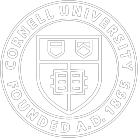Open Positions
Postdoctoral Position tumor cell invasion (collaborative work with Syracuse University)
How does the interplay between the mechanics of the extracellular matrix (ECM) and the rigidity/fluidity of an embedded tumor spheroid potentially prime the spheroid for invasion? The groups of Jen Schwarz (Syracuse), Lisa Manning (Syracuse), and Mingming Wu (Cornell) are seeking post-doctoral candidates interested in answering this question, and related ones, using both modeling and experimental approaches. The modeling will be conducted at Syracuse University in the groups of Jen Schwarz and Lisa Manning to be followed by experimental tests of the modeling predictions in the group of Mingming Wu at Cornell University. The candidate’s primary background should be theoretical but with an itch to set foot in an experimental setting and work with a leading experimentalist in tumor invasion and her experienced lab members for some finite fraction of the duration of the position. The initial appointment is for one year beginning in Fall 2020, with the possibility of renewal for up to three years after which time the successful candidate will be uniquely poised to tackle additional problems in living matter where close feedback between modeling and experiments is needed to help constrain the modeling. The salary is negotiable based upon experience and research abilities.
Candidates must have a Ph.D. in Physics or a related field and have demonstrated experience in theoretical/computational soft matter or biophysics. To apply, please go visit LINK, where the applicant must upload a cover letter, a curriculum vitae, a brief description of research interests, and the email addresses of three references.
Review of candidates will begin immediately and continue until the position is filled.
Further information about the research pursued by the three PIs is available here:
Syracuse University is committed to excellence through diversity and is an affirmative action/equal opportunity employer. Members of minority groups and women are especially encouraged to apply.
Internal information required for job description:
The post-doc will be working directly with Professors Schwarz, Manning, and Wu to explore the mechanisms for tumor invasion of an embedded spheroid in extracellular matrix. The post-doc will use a mixture of computational/theoretical tools and experimental techniques to predict and experimentally test potential mechanisms. They will co-supervise theory graduate students (along with faculty mentors), participate in joint group meetings, co-write manuscripts, and complete individual development plans and other professional development training. They will also engage with other students, postdocs, and faculty in the soft matter group at Syracuse University and with the Wu lab members and related collaborators.
Research Opportunities for MS/PhD, MEng and Undergraduate Students
We have a number of research projects for students at all levels investigating cell – environment interactions, in particular with fluids, using an integrated microfluidic, imaging and theoretical modeling approach. Applications are motivated by contemporary problems in health and environment including tumor cell/tissue mechanics, plant cell mechanics, cyanobacteria growth and motility, bio-robotics and bio-energy.
Skills involved: Microfluidic device, imaging, fluid mechanics, cell biology, and biophysics.
Note on undergraduate research in Nano/microbio lab
We have a range of undergraduate research projects in the Nano/Microbio Lab, from instrument development to statistical analysis of cell locomotion. Undergraduate researchers have always played significant roles in the lab. Many of our undergraduate researchers have had one or more publications in internationally known and peer reviewed journals as a result of their work in the lab, or presented in nationwide meetings. In addition, many our undergraduate researchers have won on campus and off campus undergraduate research fellowships, these include NSF graduate research fellowship, Engineering Learning Initiative undergraduate research fellowship and NIH post-baccalaureate fellowship. Team work is highly encouraged in our lab, and all the undergraduate students work closely with either a postdoc or a graduate student or a professor. We encourage students to work part time (10 hrs per week) on the project during the semester for course credit, and full time over the summer with a stipend or a fellowship.
Updated September 4, 2020.
Site created and maintained by Young Joon Suh

